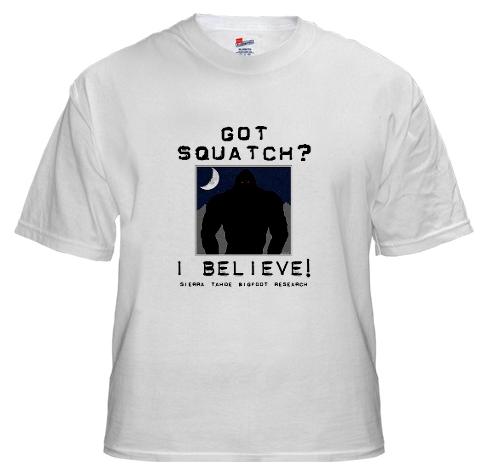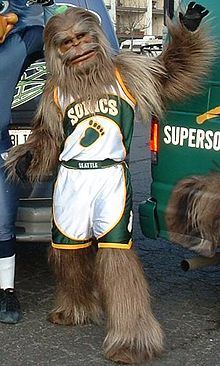
July 16, 2011
Due to the Animal Planet series Finding Bigfoot, most of us now are familiar with the use of such phrases as “I think we’ve got a Squatch” or “I think I hear a Squatch.”

“Got Squatch” seems to be popular for tee-shirts.
But how long has “Squatch” been around? And what is a “Squatch”?

For one thing, searching for the word on the Urban Dictionary site was not a good idea. The word “squatch” has so many disgusting meanings associated with parts of the female body that if proper Bigfoot-hunting-parties understood those definitions they would never use “Squatch” again. Indeed, they would not have even started down this verbal path, and the editors at Animal Planet won’t have gone this route either, keeping the word in the series mix so extensively.

In general, for most less-than-streetwise Bigfooters, of course, the word is merely a shortened form of “Sasquatch.”

The term does have a restricted popular cultural history. Wikipedia actually has a few paragraphs about the word. You might be surprised what the focus turns out to be there. This is what someone wrote on that site:
Squatch (a derivation of Sasquatch) was the team mascot for the Seattle SuperSonics of the National Basketball Association. Between his 1993 debut and the team’s relocation in 2008 to Oklahoma City, Squatch appeared at more than 175 events annually, and was with the organization during their run to the 1996 NBA Finals.
In 2007, Chris Ballew of the rock band Presidents of the United States of America wrote and performed a song about the mascot. That same year, Squatch attempted to set a world record with a jump of 30 feet on inline skates, over vehicles owned by NBA players Ray Allen and Robert Swift.
The biography of the Edmonton Rush Lacrosse Club‘s Yeti mascot, Slush, describes a history wherein the two characters grew up together in the Cascade Mountains. Squatch appeared during the Rush’s inaugural game to “teach” Slush how to be a professional mascot.
Following the move of the SuperSonics to Oklahoma City, the character was retired, and remains part of the intellectual property (name, colors, et cetera) that the City of Seattle retained as part of the KeyArena lease settlement. The character’s performer from 1999-2008 remains under contract with the relocated team.

Basketball? Well, the popularization of words happens in many ways.
So we find ourselves in the situation we do today. For example, I can stop into the local Portland, Maine convenience store named Joe’s Smoke Shop, and hear people talking about “that television show” where they say “Squatch all the time,” as I did yesterday. We have the major cross-cultural integration of this term into our society occurring this summer, and folks within cryptozoology and Bigfoot studies may not truly realize it. Finding Bigfoot is adding new terms to the American language faster than can be imagined.
So, “Squatch on,” folks, and use the word and aligned phrases as much as you want or don’t want to. It really doesn’t matter any longer, because North Americans are using “Squatch” humorously and routinely as much as they wish to in 2011. And it is all thanks to Finding Bigfoot, not the Seattle SuperSonics.
About Loren Coleman
Loren Coleman is one of the world’s leading cryptozoologists, some say “the” leading living cryptozoologist. Certainly, he is acknowledged as the current living American researcher and writer who has most popularized cryptozoology in the late 20th and early 21st centuries.
Starting his fieldwork and investigations in 1960, after traveling and trekking extensively in pursuit of cryptozoological mysteries, Coleman began writing to share his experiences in 1969. An honorary member of Ivan T. Sanderson’s Society for the Investigation of the Unexplained in the 1970s, Coleman has been bestowed with similar honorary memberships of the North Idaho College Cryptozoology Club in 1983, and in subsequent years, that of the British Columbia Scientific Cryptozoology Club, CryptoSafari International, and other international organizations. He was also a Life Member and Benefactor of the International Society of Cryptozoology (now-defunct).
Loren Coleman’s daily blog, as a member of the Cryptomundo Team, served as an ongoing avenue of communication for the ever-growing body of cryptozoo news from 2005 through 2013. He returned as an infrequent contributor beginning Halloween week of 2015.
Coleman is the founder in 2003, and current director of the International Cryptozoology Museum in Portland, Maine.
Filed under Bigfoot, Cryptomundo Exclusive, Cryptotourism, CryptoZoo News, Cryptozoology, Pop Culture, Sasquatch, Television, Twilight Language